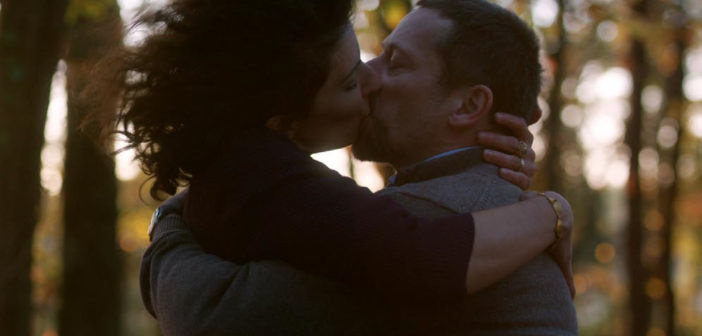Julien (Mathieu Amalric) and Esther (Stéphanie Cléau) lay about in various stages of coitus, professing and enacting their murky and off-putting feelings for each other. Sometimes together, sometimes alone. These are stolen moments, heightened by the limitations of time and shot through the eye of a dispassionate voyeur. She bites him and draws blood. He strides around the room boldly and nakedly. Both dangerously unbound from their outside lives. You get the impression, as Julien stands by the balcony watching people milling in the square below, of a figure standing too close to the edge of a cliff.
From here, Amalric’s directorial debut, The Blue Room, takes the long way round to showing us who these two were to each other and where they are headed. We do learn, relatively quickly that Julien is married to another woman, raising a child in the picturesque French countryside. He is also, at some point after the titular blue room’s sexcapades, the subject of a series of dry, procedural police interviews. About what exactly is elusive to begin with. We know only that authorities are overly curious with regards to Julien’s time with Esther. When their meetings occurred, what was said, what took place and who promised what to whom.
Amalric is not interested in playing his hand too early, and from the early going the film plays it coy and cool. Revealing only enough, scene by scene, for each new fragment of the story to be told, with each new scene simultaneously shedding light on the previous. This kaleidoscopic structure can be disorienting at first. But surely that’s the point. Mathieu’s Julien is himself confused and disoriented to begin with. Or so it is implied.
In a move to further unsettle the viewer, Julien’s outer and inner lives appear as starkly cold and austere as the modern and sterile country house he shares with his wife and daughter. Especially so for someone who works in some capacity with John Deere farming equipment. The dirt and the earth so much a part of his work life barely intrude on his outside life at all.
As the plot of the film unwinds, and we become more and more aware as to the severity of Julien’s situation and the true nature of his relationship with Esther becomes clear these realisations bring with them a creeping sense of dread. Before it is revealed to us what is going on, we know what is going on. Amalric is surely familiar with the paranoid thrillers of Roman Polanski. The film is, ultimately, too cold and bloodless to be described as a thriller, although it flirts with heading in that direction throughout. The chills though are present even while their nature remains elusive.
For all that, the truly puzzling element of The Blue Room, staying somewhat out of reach even as the credits roll, is Julien. Just what he thinks about his predicament, with the obvious exception of the shock and disruptive force of events, remains unknowable to the end. His thoughts as to his relative guilt and complicity, and the extent to which he accepts responsibility for events, at the beginning, throughout and at their tragic conclusion, stays (depending, maybe, on your point of view) maddeningly out of reach. He of course makes countless overtures to innocence and shock and you might think that was the end of the story were it not for his body language and his eyes, like those of a cornered animal, suggesting otherwise.




